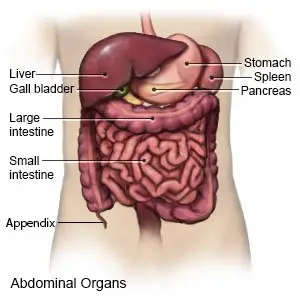What is celiac disease?
Celiac disease is a long-term condition that affects your small intestine. Your immune system reacts to the protein gluten in food and damages your small intestine. You may not be able to absorb vitamins, minerals, and other nutrients from the foods you eat.
 |
What increases my risk for celiac disease?
The cause of celiac disease is not known. You are at higher risk if you have another autoimmune disease, such as rheumatoid arthritis, or a family member with celiac disease.
What are the signs and symptoms of celiac disease?
- Diarrhea that may smell bad or look oily, and stomach cramps
- Stomach pain, bloating, and gas
- Loss of appetite or weight loss
- Weakness or low energy
- Bone pain or osteoporosis (bone loss)
- Missed monthly periods or difficulty getting pregnant
- Numbness or tingling in your legs and muscle cramps
- Mouth sores or a skin rash that itches
How is celiac disease diagnosed?
Your healthcare provider will examine you and ask about your symptoms. Tell your provider if symptoms happen when you have certain foods or drinks. Include everything that causes symptoms, and how long it takes them to begin. You may need to work with a dietitian or your provider to make meal plans that do not contain gluten. This can help confirm that gluten is causing your symptoms. You may also need these or other tests to confirm or rule out celiac disease:
- Blood tests are used to check for antibodies to gluten. They may also be used to check for anemia and other deficiencies caused by celiac disease.
- A sample of your bowel movement is tested to see if you are absorbing nutrients from your diet. For this test, you will need to eat a high-fat diet for 1 day. Then you will need to collect your bowel movements for 2 days. The samples will be sent to a lab.
- Small bowel barium x-rays are pictures of your abdomen. You will need to swallow a thick liquid called barium. Barium helps the intestines show up better on the x-ray.
- An endoscopic tissue biopsy is a procedure to look at the inside of your small intestine. An endoscope is a bendable tube with a light and camera on the end. Healthcare providers may remove a small amount of tissue for a biopsy.
How is celiac disease treated?
Celiac disease cannot be cured. The goal of treatment is to reduce the symptoms. It may take 6 months or longer for your intestines to function better. You may need medicine such as steroids to control your immune system and decrease inflammation.
Treatment options
The following list of medications are in some way related to or used in the treatment of this condition.
- infliximab
How do I manage celiac disease?
- Do not eat food that contains gluten. This is the most important way to manage your symptoms. Do not eat anything made with wheat, rye, barley, or oats. Gluten is found in additives in many packaged and restaurant foods. Read food labels or ask before you order food. A dietitian can help you plan meals that do not contain gluten.

- Ask about supplements. You may need to take supplements that contain iron, folic acid, vitamin B12, calcium, or vitamin D.
When should I seek immediate care?
- You have severe abdominal pain.
- You have blood in your bowel movement.
When should I call my doctor?
- You have a fever.
- You have new symptoms or your symptoms get worse.
- You have questions or concerns about your condition or care.
Care Agreement
You have the right to help plan your care. Learn about your health condition and how it may be treated. Discuss treatment options with your healthcare providers to decide what care you want to receive. You always have the right to refuse treatment. The above information is an educational aid only. It is not intended as medical advice for individual conditions or treatments. Talk to your doctor, nurse or pharmacist before following any medical regimen to see if it is safe and effective for you.© Copyright Merative 2023 Information is for End User's use only and may not be sold, redistributed or otherwise used for commercial purposes.




